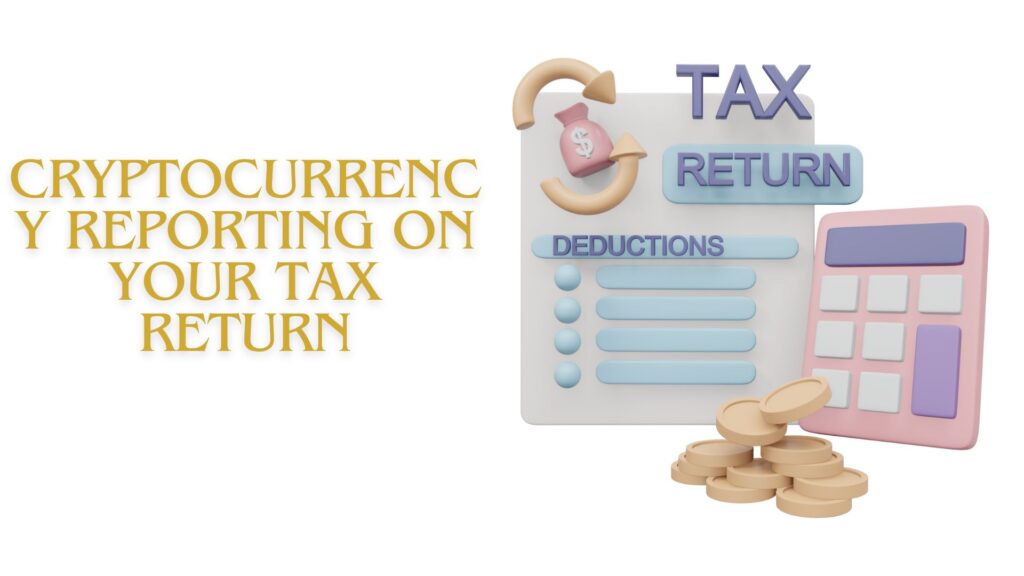Cryptocurrency has expanded from a specialized sector to a popular avenue for investing in recent years. But because of the IRS’s heightened scrutiny as a result of this quick expansion, investors are now required to record their cryptocurrency activity. All of the information you require regarding bitcoin taxes in the United States is included in this book, including tax regulations, reporting requirements, tax deductions, and typical blunders to avoid.
1. Introduction to Cryptocurrency Taxes
As cryptocurrencies like Bitcoin and Ethereum have gained popularity, tax authorities worldwide have increased their attention to digital asset surveillance. because the IRS wiews cryptocurrencies as property in the USA, there may be tax ramifications associated with every transaction involving them, including trading, selling, and making purchases.
2.Knowledge of US Cryptocurrency Tax Laws

IRS Classification of Cryptocurrency
Cryptocurrency is not considered cash by the IRS, but rather property. This has an impact on how your tax return reports profits and losses from cryptocurrency trades. Every cryptocurrency transaction is regarded as a taxable event.
Tax Forms to Use
- Form 8949: Used to report individual capital gains and losses from crypocurrency transactions.
- Schedule D: Summarizes total capital gains and losses.
- Form 1040: The primary tax return form where crypto income and gains are reported.
External Resource: IRS Guidance on Virtual Currency
3. Types of Cryptocurrency Taxable Events
Selling Cryptocurrency for USD
It is taxed to sell your cryptocurrency for cash. Any profit or loss must be reported to the IRS.
Trading One Cryptocurrency for Another
A taxable event occurs when you exchange one kind of cryptocurrency for another, such as Bitcoin for Ethereum.
Purchasing Goods or Services with Cryptocurrency
Since gains or losses must be calculated at the time of purchase, using cryptocurrency to make transactions is also taxed.
Receiving Cryptocurrency as Income
Any Bitcoin that is paid for with cash is regarded as revenue.
4. Calculating Capital Gains and Losses
Cost Basis and Fair Market Value (FMV) at the time of the transaction are two crucial criteria that you must comprehend in order to appropriately report your gains and losses.
- Cost Basis: The original purchase price of the cryptocurrency.
- Fair Market Value (FMV): The value of the cryptocurrency at the time of the taxable event.
Long-Term vs. Short-Term Gains
- Long-Term Capital Gains : (held for more than a year) have favorable tax rates.
- Short-Term Capital Gains: (held for a year or less) are taxed as ordinary income.
Example Calculation
If you bought 1 Bitcoin for $10,000 and sold it a year later for $30,000:
Capital Gain=$30,000-$10,000=$20,000,
Internal Recource: How to Calculate Capital Gains
5. Cryptocurrency Reporting on Your Tax Return

Steps for Filling
1. Gather transaction data: Such as dates, amounts, and values.
2. Calculate Gains and Losses: Report each taxable event using Form 8949.
3. Summarize on Schedule D: Enter your totals here.
4. Report on Form 1040: List all of your profits or losses.
External Recource: IRS Form 8949 Instructions
6. Crypto Investor Tax Deductions
You can deduct losses in some situations, even though there aren’t many deductions especially for cryptocurrency. These are some important choices:
- Crypto Loss Deduction: Up to $3,000 in capital gains can be offset by capital losses.
- Carryover of Losses: Unused losses may be carried forward to subsequent tax years.
7. Tools and Software for Cryptocurrency Tax Filling
Crypto tax software is used by numerous investors to make crypto tax reporting easier. Among the top choices available on the market are:
- CoinTracker: Mointors transactions on exchanges and wallets.
- CryptoTrader Tax: Enables users to import information straight from exchanges.
- Koinly: Offers support for a large number of exchanges and cryptocurrencies.
These programs make it simler to file an accurate tax return by automating thee process of calculating gains and losses.
Internal Resouce: Best Cryptocurrency Tax Software
8. Typical Cryptocurrency Tax Errors to Pervent
Not Reporting All Transactions
Altough the IRS mandates reporting for all transactions, some investors think that only significant transactions must be disclosed.
Misunderstanding Cost Basis
Inaccurate tax reporting may result from a poor cost basis calculation.
Ignoring Taxable Events in Defi and NFTs
NFTs, staking, and DeFi earnings are all potentially taxable, and there may be fines for not reporting these transactions.
9. Future of Cryptocurrency Taxation

The IRS is probably going to be more closely watched as cryptocurrency adoption rises. Maintaing awareness is crucial since regulatory updates may inroduce more detailed guidelines.
10. Conclusion
Understanding your obligations is essential to ramaining compliant while filing taxes on cryptocurrencies, even though it may feel comlicated. You may easily negotiate the difficulties of bitcoin taxation by maintaining accurate records, utilizing practical tools, and keeping up of the most recent IRS regulations.




0 Comments